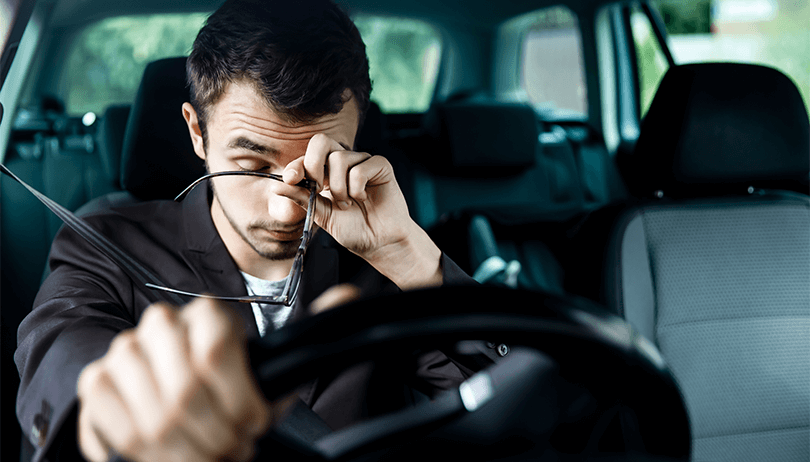Here at Brum Driving School in Birmingham, we take safety very seriously indeed. It’s certainly common knowledge that driving under the influence of drink or drugs can cause real danger on the road. But did you know, tired driving poses an equal level of threat?
A person driving after being awake for 17 hours has the impaired driving skills of someone who has a 0.05mg/ml blood alcohol level. Extend that to 24 hours of no sleep and the equivalent blood alcohol level reaches illegal levels of 0.1g/l3 (Road Safety Scotland, 2020).
Experts have estimated that collisions involving driver fatigue are under-reported but are likely to account for up to 30% of all UK vehicle collisions, and 25% of fatal and serious accidents (Road Safety Scotland, 2020).
Our driving school in Birmingham has a core focus on teaching our students how to drive in the safest way possible. We’ve put together some information to help you notice the signs and avoid accidents due to tired driving.
What are the dangers of driving when tired?
You can be too slow to react. Reactions and reflexes can be substantially impaired, meaning a tired driver could respond too slowly to a hazard, e.g. braking too late, causing rear-end crashes.
You may miss important hazards. Observation skills become a lot worse when tired, meaning you could miss something hazardous entirely; a person crossing the road, another car turning or stopping.
Your coordination deteriorates. Impaired coordination can result in a driver slowing down, speeding up, or moving out of your lane without even realising.
The AA Charitable Trust conducted a #drowsydriver campaign in 2018, and its findings were disconcerting.
An astonishing 1 in 8 UK drivers admitted to having fallen asleep at the wheel at some stage in their lives.
Just under 40% said they had felt so tired whilst driving that they were scared they were about to fall asleep.
Who is most at risk?
There are two groups of people that are most at risk of tiredness when driving:
- Working drivers – Those who work behind the wheel are particularly at risk from tiredness, as they will typically spend longer hours driving. In fact, 40% of tiredness-related crashes involve a commercial vehicle (Royal Society for the Prevention of Accidents, 2001).
- Younger people – Those aged 30 or below are prone to habits that promote tiredness: staying up all night, surviving on less-than-adequate sleep, excessive screen time and consumption of stimulants.
Worryingly, young drivers (aged 18-24) are most likely to carry on regardless of if they feel tired when driving (18%, compared to 3% of all drivers), believing tiredness does not affect their driving ability (13% compared to 2% of all drivers) (The AA, 2019).
The prefrontal cortex, the decision-making part of the brain, is not yet fully developed until age 25, resulting in this same age group being more willing to take uncalculated risks.
Tired driving doesn’t happen without warning
Fatigue does not happen suddenly. Though most people recognise the symptoms of being tired, many underestimate the dangers involved with tired driving.
The symptoms of tiredness and fatigue include:
- Increased difficulty concentrating on the road
- Frequent yawning
- Eyelids feeling heavy and full
- Eyes feel like they’re starting to ‘roll’
- Head feels heavy and nods

Make sure you’ve prepared
Planning your journey can ensure you don’t get tired.
Most long journeys happen with a bit of notice, so make sure you’re well-rested before you head out. Plan a 15-minute rest stop for every 2 hours of the journey, allowing you to stretch your legs, go to the toilet and have something to eat or drink.
In general, healthier habits can help prevent tiredness-related road accidents. Sleep requirements vary from person to person, but on average, an adult needs 7-9 hours of sleep every night. If you’re often not hitting that target, look at changing daily activities around, reducing screen time in the evenings or setting an earlier bedtime.
If you feel tired regularly, or have health problems that regularly affect your sleep, go and see your doctor. In the case of commercial drivers, it’s also advisable to speak to your boss and let them know if you suffer from any sleep disorders.
If tiredness hits, just stop driving
There is only one effective way to deal with tiredness when driving, and that is to stop and take a break. There is no journey so urgent it is worth risking your life and the lives of others for.
Contrary to popular belief, winding windows down, turning the air conditioning or radio up to full blast is not going to combat the dangers of tired driving. In fact, they may distract drivers even more.
Firstly, stop in a safe place – a motorway services station is ideal. Drink a caffeinated energy drink or two cups of coffee. Take a nap of around 15-20 minutes if possible too.
Brum Driving School is a driving school in Birmingham, proud to champion safe driving, actively seeking to raise standards in our city with flexible, client-centred driving tuition. For more information, contact us today.
